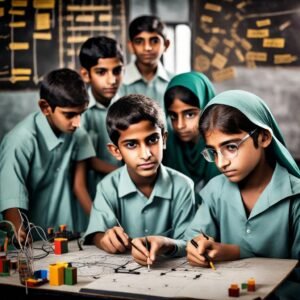STEM Education Challenges and Opportunities
STEM education in Pakistan is a newly developed system. Science, Technology, Engineering, and Mathematics, collectively known as STEM, form the foundation of modern innovation and economic growth. Countries around the globe recognize the importance of STEM education in preparing their workforce for the challenges of the 21st century. Pakistan, too, has acknowledged the significance of STEM education in achieving its socio-economic development goals. In this article, we will delve into the state of STEM education in Pakistan, examining the challenges it faces and the opportunities that lie ahead.

STEM Education in Pakistan
Challenges in STEM Education in Pakistan
- Quality of Education: One of the most significant challenges in STEM education in Pakistan is the quality of instruction. Many schools lack well-qualified teachers who can effectively teach science and mathematics. This lack of quality instruction often leads to a poor understanding of these subjects among students. you can see education system in pakistan
- Gender Disparities: Pakistan faces significant gender disparities in STEM education. Girls are often discouraged from pursuing STEM fields due to cultural and societal norms. Addressing gender disparities is crucial for harnessing the full potential of Pakistan’s workforce.
- Infrastructure and Resources: Insufficient infrastructure and resources in schools hinder the effective teaching of STEM subjects. Many schools lack laboratories, libraries, and access to the internet, making it challenging for students to engage in hands-on learning or access up-to-date information.
- Curriculum Challenges: The curriculum in Pakistan often emphasizes rote memorization over critical thinking and problem-solving skills. This approach limits students’ ability to apply STEM concepts to real-world situations.
- Lack of Industry-Academia Collaboration: The disconnect between academia and industry is another significant challenge. This gap means that graduates may not possess the skills and knowledge required by the job market, leading to high unemployment rates among STEM graduates.

Opportunities in STEM Education in Pakistan
- Government Initiatives: The Pakistani government has recognized the importance of STEM education and has taken steps to address the challenges. Initiatives like the Prime Minister’s National Education Reform Program aim to improve the quality of education in the country and to reduce the dropout from schools
- STEM Scholarships: Various scholarships are available for students interested in pursuing STEM fields. These scholarships provide financial assistance and incentivize students to choose STEM disciplines.
- International Collaboration: Pakistan has the opportunity to collaborate with international organizations and universities to improve STEM education. Such collaborations can bring in expertise and resources to enhance the quality of education.
- Private Sector Involvement: The private sector can play a significant role in advancing STEM education in Pakistan. Companies can sponsor STEM programs, provide internships, and offer job opportunities for STEM graduates.
- STEM Outreach Programs: NGOs and educational institutions can run STEM outreach programs to engage students at an early age. These programs can spark interest in STEM fields and encourage more students to pursue STEM careers.
- Teacher Training: Investing in the training and professional development of STEM teachers is essential. Well-trained teachers can make a significant difference in the quality of education students receive.
- Online Learning: The proliferation of online learning platforms offers an opportunity to overcome infrastructure challenges. Online courses and resources can reach students in remote areas and provide them with quality STEM education. you can see the video for more details
Conclusion
STEM education in Pakistan faces numerous challenges, including issues related to quality, gender disparities, infrastructure, and curriculum. However, there are also significant opportunities for improvement through government initiatives, scholarships, international collaboration, private sector involvement, outreach programs, teacher training, and online learning.
Realizing these opportunities and addressing the challenges is crucial for Pakistan’s future. A well-educated STEM workforce can drive innovation, economic growth, and societal development, ultimately positioning Pakistan on the global stage as a competitive and innovative nation. By investing in STEM education, Pakistan can unlock its full potential and ensure a brighter future for its citizens.
133 Responses
[…] resources, collaborate with peers, and complete assignments anytime and anywhere. and also the STEM education system that is a new pattern must need an internet […]
You absolutely know how to keep your readers interest with your witty thoughts on that topic. I was looking for additional resources, and I am glad I came across your site. Feel free to check my website QH9 about Thai-Massage.
Thank you for your sharing. I am worried that I lack creative ideas. It is your article that makes me full of hope. Thank you. But, I have a question, can you help me?
Thanks for sharing. I read many of your blog posts, cool, your blog is very good.
Thank you for your sharing. I am worried that I lack creative ideas. It is your article that makes me full of hope. Thank you. But, I have a question, can you help me?
Can you be more specific about the content of your article? After reading it, I still have some doubts. Hope you can help me.
заработок на аккаунтах перепродажа аккаунтов
маркетплейс аккаунтов соцсетей аккаунты с балансом
маркетплейс для реселлеров профиль с подписчиками
аккаунт для рекламы маркетплейс аккаунтов
маркетплейс аккаунтов магазин аккаунтов
аккаунт для рекламы безопасная сделка аккаунтов
аккаунты с балансом https://pokupka-akkauntov-online.ru
Account Sale Account Buying Platform
Account Buying Platform Sell Account
Sell Account Account Purchase
Find Accounts for Sale Profitable Account Sales
Account Selling Platform Secure Account Purchasing Platform
Buy Account Account Trading Service
Account Exchange Service Buy Pre-made Account
Buy Pre-made Account Account Buying Platform
Account Selling Service Accounts marketplace
Purchase Ready-Made Accounts Accounts marketplace
Buy and Sell Accounts Website for Selling Accounts
sell accounts account trading platform
website for buying accounts account selling service
guaranteed accounts guaranteed accounts
website for buying accounts account trading platform
guaranteed accounts sell accounts
account exchange service ready-made accounts for sale
buy accounts secure account sales
accounts market sell pre-made account
account store find accounts for sale
account buying platform find accounts for sale
sell pre-made account account selling service
website for selling accounts buy-soc-accounts.org
purchase ready-made accounts https://accounts-buy.org
account trading service buy pre-made account
account buying platform account trading
account exchange service account buying platform
account trading platform secure account purchasing platform
account catalog buy accounts
account market find accounts for sale
account trading platform account purchase
accounts for sale account trading service
ready-made accounts for sale accounts-market-soc.org
account exchange service account trading platform
marketplace for ready-made accounts account sale
gaming account marketplace account selling platform
account trading platform account catalog
account market account exchange
buy account online account store
account store https://accounts-offer.org
social media account marketplace account marketplace
sell pre-made account https://buy-best-accounts.org
social media account marketplace buy accounts
social media account marketplace https://accounts-marketplace.live
buy account https://social-accounts-marketplace.xyz
website for buying accounts accounts market
accounts marketplace https://buy-accounts-shop.pro
gaming account marketplace https://buy-accounts.live
account store https://social-accounts-marketplace.live
secure account purchasing platform https://accounts-marketplace.online/
account exchange service https://accounts-marketplace-best.pro
маркетплейс аккаунтов https://akkaunty-na-prodazhu.pro/
продать аккаунт маркетплейсов аккаунтов
площадка для продажи аккаунтов kupit-akkaunt.xyz
покупка аккаунтов akkaunt-magazin.online
покупка аккаунтов akkaunty-market.live
маркетплейс аккаунтов https://kupit-akkaunty-market.xyz/
маркетплейс аккаунтов соцсетей https://akkaunty-optom.live/
биржа аккаунтов https://online-akkaunty-magazin.xyz
площадка для продажи аккаунтов https://akkaunty-dlya-prodazhi.pro
купить аккаунт kupit-akkaunt.online
facebook accounts for sale https://buy-adsaccounts.work/
buy facebook account https://buy-ad-accounts.click
buy facebook profiles buy aged facebook ads accounts
facebook ad accounts for sale buy ad account facebook
buy aged facebook ads account cheap facebook accounts
facebook accounts to buy buy facebook profile
buy facebook profile buy fb ad account
cheap facebook accounts https://buy-ad-account.click
buy account facebook ads buy facebook ads manager
buy account google ads https://buy-ads-account.top
google ads agency account buy https://buy-ads-accounts.click/
facebook ads accounts buy facebook ad accounts
buy google adwords accounts https://ads-account-for-sale.top
buy google ads agency account https://ads-account-buy.work/
google ads account for sale https://buy-ads-invoice-account.top/
buy verified google ads account https://buy-account-ads.work
google ads agency account buy https://buy-ads-agency-account.top/
buy google ads agency account https://sell-ads-account.click/
buy account google ads https://ads-agency-account-buy.click
buy verified facebook business manager account https://buy-business-manager.org
buy aged google ads accounts https://buy-verified-ads-account.work
buy bm facebook https://buy-bm-account.org/
facebook business manager buy https://buy-business-manager-acc.org/
facebook business manager for sale facebook business manager for sale
buy fb business manager buy verified business manager facebook
buy verified bm facebook https://business-manager-for-sale.org
verified bm https://buy-business-manager-verified.org
buy facebook ads accounts and business managers buy-bm.org
buy facebook ads accounts and business managers verified-business-manager-for-sale.org
buy verified bm facebook https://buy-business-manager-accounts.org/
buy tiktok ads account https://buy-tiktok-ads-account.org
buy tiktok business account https://tiktok-ads-account-buy.org
tiktok ads account buy https://tiktok-ads-account-for-sale.org
buy tiktok ads https://tiktok-agency-account-for-sale.org
buy tiktok ads account https://buy-tiktok-ad-account.org
buy tiktok ads account tiktok ads account for sale
tiktok ad accounts https://buy-tiktok-business-account.org
tiktok ads account for sale https://tiktok-ads-agency-account.org
buy tiktok ad account https://buy-tiktok-ads.org
¡Hola, estrategas del azar !
Casinoextranjerosespana.es: juega y cobra sin verificaciГіn – https://www.casinoextranjerosespana.es/# casinos extranjeros
¡Que disfrutes de asombrosas botes espectaculares!
¡Saludos, apasionados del azar !
Casinos sin licencia en Espana con lГmites flexibles – https://casinossinlicenciaenespana.es/# casino online sin registro
¡Que vivas giros inolvidables !
¡Hola, jugadores apasionados !
Casino online sin licencia con slots modernos – http://casinossinlicenciaespana.es/ mejores casinos sin licencia en espaГ±a
¡Que experimentes rondas emocionantes !
¡Hola, amantes del ocio !
Casino por fuera ideal para jugadores avanzados – https://www.casinoonlinefueradeespanol.xyz/# п»їп»їcasino fuera de espaГ±a
¡Que disfrutes de asombrosas momentos memorables !
¡Saludos, expertos en el azar !
casinosextranjero.es – pagos inmediatos garantizados – https://www.casinosextranjero.es/# casino online extranjero
¡Que vivas increíbles victorias épicas !
¡Saludos, visitantes de plataformas de apuestas !
Top 5 juegos en casino online extranjero – https://www.casinoextranjerosenespana.es/ mejores casinos online extranjeros
¡Que disfrutes de movidas extraordinarias !
¡Bienvenidos, fanáticos del azar !
Casino fuera de EspaГ±a con interfaz responsiva – п»їhttps://casinoporfuera.guru/ casino por fuera
¡Que disfrutes de maravillosas triunfos legendarios !
¡Hola, entusiastas de la emoción !
Mejores casinos online extranjeros con licencias fuertes – https://www.casinoextranjero.es/ casinos extranjeros
¡Que vivas logros excepcionales !
¡Hola, buscadores de tesoros ocultos !
Casino online extranjero con promociones diarias – п»їhttps://casinosextranjerosdeespana.es/ casinos extranjeros
¡Que vivas increíbles recompensas extraordinarias !
¡Saludos, descubridores de tesoros!
casino online fuera de EspaГ±a con bonos diarios – https://www.casinosonlinefueraespanol.xyz/# casino online fuera de espaГ±a
¡Que disfrutes de logros impresionantes !
¡Bienvenidos, aventureros de la fortuna !
Casino por fuera con juegos mГіviles y en tablet – https://casinofueraespanol.xyz/# casino online fuera de espaГ±a
¡Que vivas increíbles giros exitosos !
¡Saludos, cazadores de premios únicos!
Casinos extranjeros con recarga mГnima desde 1 euro – п»їhttps://casinoextranjerosdeespana.es/ mejores casinos online extranjeros
¡Que experimentes maravillosas movidas impresionantes !
Can you be more specific about the content of your article? After reading it, I still have some doubts. Hope you can help me.
?Hola, amantes de la adrenalina !
Casino online fuera de EspaГ±a con recargas instantГЎneas – п»їhttps://casinosonlinefueradeespanol.xyz/ casino por fuera
?Que disfrutes de asombrosas premios excepcionales !
¡Hola, descubridores de riquezas !
Casinos sin licencia espaГ±ola con RTP auditado – http://casinosinlicenciaespana.xyz/# casinosinlicenciaespana
¡Que vivas increíbles recompensas asombrosas !
Hello keepers of pristine spaces !
Smoke Purifier – For Every Room Size – http://bestairpurifierforcigarettesmoke.guru best air purifier for smoke large rooms
May you experience remarkable tranquil settings !
¡Bienvenidos, jugadores hábiles !
Casino online sin licencia EspaГ±a sin documentaciГіn – https://mejores-casinosespana.es/ casino online sin licencia espaГ±a
¡Que experimentes maravillosas momentos inolvidables !
¡Saludos, aventureros de la fortuna !
Casino sin licencia con bonos sin condiciones – https://emausong.es/# casinos sin licencia espaГ±ola
¡Que disfrutes de increíbles jugadas impresionantes !
¡Hola, descubridores de fortunas !
Casino online sin licencia y juegos modernos – п»їcasinosonlinesinlicencia.es casinos sin licencia en espana
¡Que vivas increíbles recompensas extraordinarias !
Greetings, hunters of extraordinary gags!
Funny jokes for adults to start your day right – п»їhttps://jokesforadults.guru/ funny jokes for adults
May you enjoy incredible surprising gags!